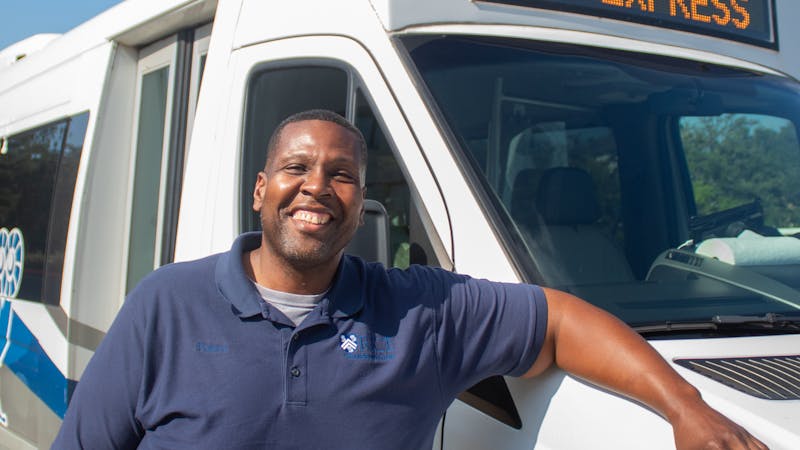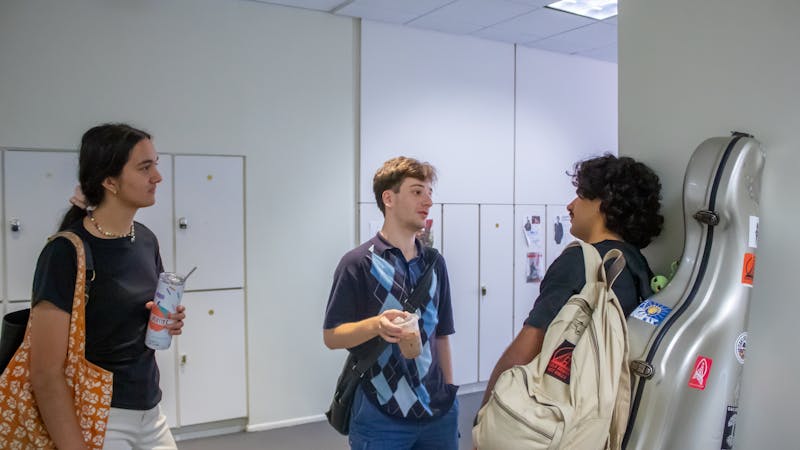Rice Eclipse launches rockets, shoots for stars

Guillian Paguila / Thresher
While most Rice students were sleeping in the morning of March 26, a group of students were in transit to launch rockets an hour away. These students had spent hours working in the Oshman Engineering Design Kitchen on their rockets with Rice Eclipse and were now ready to get their L1 rocketry certification.
Eclipse member Devin Von Arx was one of the students launching rockets that morning, as the final stage of her rocketry certification.
“During the launch, it’s an unbelievable feeling, seeing something you build come to life and be launched into the air,” Von Arx, a Hanszen College freshman, said. “It’s a culmination of a week of hard work, a week of learning the ins and outs of rocketry.”
The certification system teaches students to construct their own rocket. In order to receive a certification, a student must attend introductory rocketry courses and then construct their own rocket based on a blueprint provided by the club. Although it is not a prerequisite for membership in the club, certifications are required for purchasing more complex engines.
Eclipse’s chief engineer Andrew Bare noted that although rocketry can seem intimidating at the outset, the certification program makes it much more approachable.
“For me it was really eye-opening, because it looks like a really complex system when you first start looking at [a rocket] when you don’t have any experience,” Bare, a Hanszen junior, said. “But the more you work with it, the more you get to see really clearly how all the parts fit together.”
The certification program offers a taste of what Eclipse has to offer, but most of the work the club does is in preparation for a number of competitions. The club is currently in the preparation phase for the Spaceport America competition this summer, in which approximately 150 teams participate. This year’s rocket, Icarus and Daedalus, is dual-stage, which is new ground for the club, Nancy Lindsey, the aerodynamics and structures lead for the club, said.
“That’s kind of been my passion project,” Lindsey, a Jones College junior, said. “I really wanted us to push ourselves. Historically, we’ve always done these single stage, six inch diameter rockets … but it’s actually more like an engineering feat if you can get it to be smaller.”
Club President Jake Sperry said this project is ground-breaking for the club.
“From what I know, a lot of universities have never tried dual stage, so that is something that I think is really cool,” Sperry, a Jones junior, said. “[It’s] kind of stepping above what we’ve done before and kind of surpassing our limits.”
The dual-stage rocket is not the only thing Eclipse has planned for the future. The club has exclusively competed with store-bought engines in the past, but for next year’s Spaceport competition they plan to develop their own engine through a project dubbed Archimedes by the club. Rafe Neathery, the club’s propulsion lead, said that this project poses unique challenges.
“Kind of from the start, there’s been two main efforts in the club, there’s been building these rockets and building these engines.” Neathery, a Will Rice College junior, said. “The dream of Archimedes is to combine those two efforts to fly our own rocket with our own engine”
All of the work that goes into these competitions complements engineering coursework well and provides hands-on opportunities for engineering majors to put what they learn into practice.
“Almost anybody on Eclipse will [say] you learn so much more from these projects than you do from classes as a mechanical engineer, or an electrical engineer or a computer science major,” Lindsey said.
More from The Rice Thresher

Over 1,000 students petition against new meal plan
When Konstantin Savvon opened the Housing and Dining email announcing the new unlimited meal plan, he was instantly concerned about the impact on off-campus students like himself.

Rice shuttle bus drivers reflect on changes and connections behind the wheel
Martine Stewart has spent the past year behind the wheel of Rice’s greater loop shuttle, circling the inner campus from the early morning to late afternoon. She said she has come to recognize many of her regular riders – not just their faces, but the exact spots where they wait to be picked up.

Music majors at Rice’s Shepherd School tackle busy schedules, future goals
Cirdan Vonnahme began playing the cello at 4 years old. After winning his first competition at 11 and debuting with an orchestra, he realized he wouldn’t mind playing the cello for life.

Please note All comments are eligible for publication by The Rice Thresher.